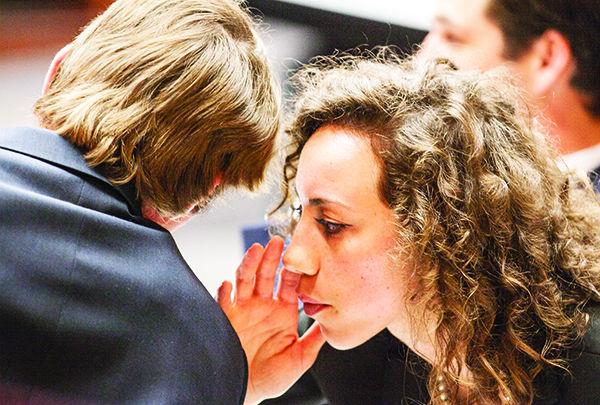At the heart of the Monday night J-Court trial that could decide the next student body president were the questions of whether fines should be levied against the SBP-elect and who has the right to assess them.
At the Murtha v. Benigno & Douglas trial hearing, all parties presented their arguments regarding SBP-elect Joseph Benigno’s alleged violations of Election Commission rules in a campaign video, titled “Go(Pro) With Joe.”
A decision is expected within 72 hours, and if J-Court elects to assess fines that exceed Benigno’s campaign budget, he could be disqualified. In that case, Michael Murtha, who finished second in the Feb. 19-20 election, would assume the position.
Murtha’s counsel began with the argument that the misapplication of election regulations to both parties violated the student Bill of Rights, which states SGA statutes and regulations must apply equally.
Murtha’s counsel said the Election Commission violated this clause by fining SBP candidate Isaiah Tsau, but not Benigno.
“Ms. Douglas offered no support from election regulations, SGA code or the university constitution that what she did by not fining Benigno is not supported in any language in any law,” economics senior Clayton Cromer said on Murtha’s behalf.
Election commissioner Emma Douglas said she considered severity and intent with the fine levied against Tsau.
Douglas argued the intent of Tsau holding a banner in the MSC was to garner votes, and because the MSC is a high-traffic area on campus, she said she was justified in giving the fine.
Mark Womack, counsel for Benigno and Class of 2011, said the power to levy fines for campaign infractions rests solely with the Election Commissioner, not J-Court.
“To assess appropriate penalties for campaign infractions, the Election Commissioner should be the one to assess quantity and amount of any penalties,” Womack said.
Another topic of debate was what constitutes “campaign material,” relating to a “Go with Joe” banner used off campus in Benigno’s campaign video.
Counsel for Murtha argued the intent of the flag was to solicit votes, making it an integral piece of the promotional video.
Cromer said election regulations state campaign material includes anything distributed or displayed with the purpose of soliciting votes for a candidate.
“This would create a loophole if you can just avoid election rules to create a video,” Cromer said.
Womack argued that holding the flag off campus was not campaigning because its purpose was to be used in the video.
“The flag is not campaign material,” Womack said. “It is a prop in a promotional video. The statutes specifically say the intent is what matters in defining a campaign material.”
Election commission regulations notwithstanding, Cromer said the six state law violations in Benigno’s video require action from J-Court because state penal code is implicitly included in SGA guidelines.
“Rolling in of the Texas Penal Code as regulations is exactly what we are contending,” Cromer said. “Any break of those rules is a major violation as defined by election regulations.”
Benigno’s counsel argued that since there was no conviction for the alleged violations of state law, J-Court could not make a ruling on them.
“[Benigno] did not violate state law, federal law, university law or election regulations,” Womack said. “The election is being taken out of the realm of the voters and into the realm of the courts.”
Following oral arguments and closing statements from each party, Chief Justice Brenton Cooper said the court would enter into deliberation with a verdict expected within 72 hours.
SBP contenders trade arguments at trial hearing
March 3, 2015

Election Commissioner Emma Douglas
Vanessa Pena — THE BATTALION
0
Donate to The Battalion
$1815
$5000
Contributed
Our Goal
Your donation will support the student journalists of Texas A&M University - College Station. Your contribution will allow us to purchase equipment and cover our annual website hosting costs, in addition to paying freelance staffers for their work, travel costs for coverage and more!
More to Discover









